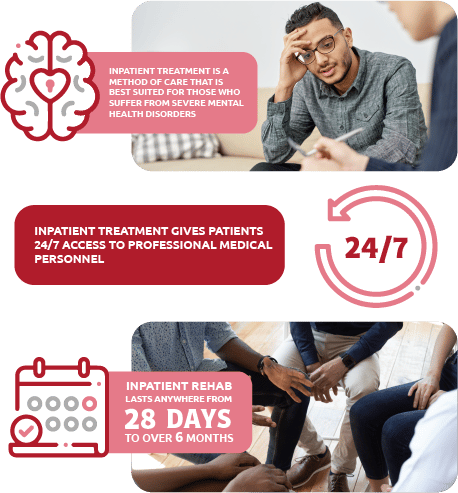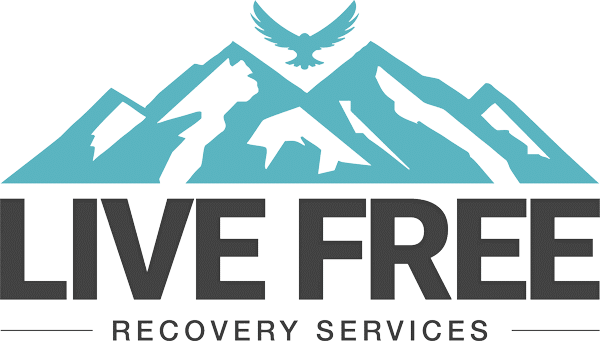Are you looking for a drug rehab program in New Hampshire that can help you or a loved one overcome an addiction? Our inpatient drug rehab program is a comprehensive recovery plan tailored for men and women that are designed to help them break the cycle of addiction and lead to healthier, more fulfilling lives.
At Live Free Recovery Center, we provide specialized inpatient drug rehab services for both men and women. Our approach to treatment is designed to target the root causes of substance abuse disorders and provide comprehensive treatment services for lasting recovery.
Our alcohol and drug rehab in New Hampshire can provide substantial recovery options for drug addiction. These addiction treatment programs are highly structured and give residents the additional support they need to beat addiction.

Table of Contents
- What Is Inpatient Drug Rehab?
- What’s the Difference Between Inpatient and Outpatient Treatment?
- What are the Benefits of Inpatient Addiction Treatment Services?
- Inpatient Detox
- Medication-Assisted Treatment (MAT)
- Different Behavioral Therapies Offered in Inpatient Care
- Care Options Available in New Hampshire
- Learn More About Our Treatment Facility in New Hampshire
What Is Inpatient Drug Rehab?
Inpatient drug rehab sometimes called residential treatment is a type of drug rehab program that provides medical and therapeutic care for people struggling with drug addiction. Patients live in the facility in order to be under constant observation, ensuring they get the best possible care and support from experienced and qualified staff. This includes 24/7 supervision in order to protect the safety and well-being of all clients in the facility, as well as to ensure that everyone in the program is following their treatment plan in its entirety.
When seeking inpatient rehab, individuals have the opportunity to choose between hospital settings or structured residential facilities that best meet their individual needs. A team of experienced clinicians will assess an individual’s requirements and develop a personalized care plan tailored specifically for them.
Long-Term Residential Care
Our New Hampshire-based alcohol and drug rehabilitation facility is renowned for its therapeutic community (TC) program, which typically lasts for 6 to 12 months. The main goal of this type of treatment offered in our facility is “resocialization” and the whole program encourages healing by involving everyone from residents to staff members as active participants.
For those dealing with substance addiction, a comprehensive approach is essential to ensure real and lasting recovery. Addiction treatment not only provides physical health care but also encourages self-discipline and responsibility while helping individuals find purpose within their lives in society. Even though long-term rehabilitation is often quite demanding due to its structured nature, it ultimately equips them with the necessary skills for overcoming substance dependence.
By participating in numerous activities, residents can gain insight into the source of their negative self-image and harmful behavior. This allows them to cultivate a calmer state of mind and develop more positive relationships with those around them.
Studies have revealed that TCs can be tailored to meet the specific needs of various individuals, such as:
- Women
- Homeless people
- Adolescents
- Those experiencing serious mental health issues
- Those in the criminal justice system
Short-Term Residential Care
Our New Hampshire rehab center offers a short-term residential care program based on the renowned 12-step approach. Initially utilized to overcome an alcohol addiction, our facility began treating other substances of abuse during the cocaine outbreak of the mid-80s. This plan typically involves a hospital-based inpatient treatment phase lasting from 3 – 6 weeks accompanied by post-treatment outpatient therapy and participation with self-help groups such as Alcoholics Anonymous (AA).
Following the completion of a residential treatment program, it is essential for people to remain engaged in outpatient and aftercare programs. By doing so, they can significantly reduce their chances of experiencing relapse once leaving the residential environment.
What’s the Difference Between Inpatient and Outpatient Treatment?
Inpatient rehabilitation programs provide intensive, round-the-clock care for individuals suffering from addiction. This type of treatment is ideal for people who need a high level of support during early recovery and those who are dealing with severe health complications due to their substance use. Inpatient drug rehab requires the patient to reside at the rehabilitation facility. This environment offers 24/7 medical monitoring and a structured lifestyle that safeguards individuals from people or circumstances they may encounter outside of treatment that could cause them to relapse.
Outpatient treatment, on the other hand, typically involves fewer hours of treatment than inpatient rehab. Outpatient programs are ideal for those who need a less intensive level of care and still have access to social or professional support systems outside of the treatment facility. Depending on the person’s needs, outpatient programs may last for weeks or months. Patients usually come to the treatment facility during certain days and times for scheduled activities, counseling sessions, or other services. They do not stay overnight in the facility and typically return home at night. Outpatient rehab is typically used as a step down from inpatient rehabilitation or as a standalone level of care.

What are the Benefits of Inpatient Addiction Treatment Services?
Struggling with substance abuse? At our inpatient drug rehab center in New Hampshire, we’ll help you determine which program is most suitable for your needs. Inpatient care offers a wide array of benefits to facilitate your recovery journey and get back on track! Here are some of the advantages:
1. Structured Environment: Patients in our inpatient rehab centers benefit from a safe, structured environment where they can focus on their recovery without distractions or temptations. During treatment, patients have access to around-the-clock care and learn how to manage triggers and cravings when they return home.
2. Quality Care: Our staff of experts has decades of experience providing patients with a variety of quality addiction treatment services that are tailored to meet individual needs. We use evidence-based practices and stay up-to-date on the latest research in order to provide the best care possible.
3. Aftercare Support: Our commitment to you does not end with treatment completion. We understand that the journey of recovery is a lifelong process and providing our patients with aftercare support following treatment is essential for their long-term success. We offer patients an array of aftercare services, including alumni meetings, group therapy sessions, and relapse prevention workshops.
4. Family Involvement: We highly value family involvement in the recovery process and encourage families to share their experiences and participate in therapy sessions. Our team is available to provide counseling and guidance to family members as well as help create a support system for the patient throughout his or her journey of healing.
5. Cutting-Edge Technology & Resources: We are committed to providing our patients with the most up-to-date resources and technology. From telehealth visits to interactive patient portals, we strive to make sure that every patient is given access to the newest treatments and information available.
6. Holistic Care: Our comprehensive approach to addiction treatment includes nutrition counseling, exercise therapy, yoga classes, and mindfulness training. We recognize the importance of treating all aspects of a person’s health in order to achieve long-term recovery.
7. Compassionate Support: We understand that overcoming addiction is a long and difficult journey. That’s why we provide focused, compassionate support to help patients every step of the way.
8. Holistic Approach: Our holistic approach to care helps patients address underlying issues that may have been contributing to their substance use disorder, enabling them to make lasting lifestyle changes and achieve true recovery.

Inpatient Detox
To ensure a safe, successful start to inpatient rehab programs across New Hampshire, medical detox is essential. This process involves removing all substances from the body that are harmful and toxic. During this time, only prescription withdrawal medications can be taken to help make the process more comfortable. All medical detox programs are accredited and administered by wellness professionals.
Detoxification is only the beginning when it comes to conquering addiction. Detox alone doesn’t address the psychological, social, and behavioral issues that are necessary for a successful recovery. Thus, after completing detox, one must be evaluated by a medical professional who can refer them to an intensive rehab program that allows for ongoing healing.
Medication-Assisted Treatment (MAT)
Medication-assisted treatment (MAT) programs can be an essential tool in helping those struggling with ongoing triggers and psychological withdrawal symptoms related to opioid or alcohol abuse. This evidence-based approach of treating mental health conditions and substance use disorders integrates the use of medications with counseling, support services, and lifestyle modifications to help individuals stay in recovery for the long term.

MAT provides medication that assists patients in focusing on their recovery by minimizing, or even eliminating, cravings and other triggers. This invaluable program is made available to individuals who qualify for substance use disorder treatment.
How MAT Programs Have Helped New Hampshire Residents
In order to curb the growing opioid crisis, New Hampshire has taken a number of steps towards:
- Addiction prevention
- Early identification
- Overdose prevention
The Bureau of Drug and Alcohol Services from the Department of Health and Human Services has drawn together healthcare professionals to analyze current practices, identify critical elements, and generate best practice suggestions in keeping with American Society for Addiction Medicine (ASAM) standards as well as other recognized national systems. Their aim is to expand access to OUD treatments across multiple settings, providing individuals with more opportunities for recovery.
Different Behavioral Therapies Offered in Inpatient Care
When it comes to inpatient care, there is a multitude of behavioral therapies available that can assist individuals with their recovery. Here are a few commonly offered treatment therapies in drug and alcohol addiction treatment centers:
Cognitive Behavioral Therapy (CBT)
CBT is based on the idea that our thoughts, feelings, and behaviors are all connected. Cognitive-Behavioral Therapy (CBT) helps individuals become mindful of their thought patterns and their effect on their behavior. This type of therapy provides people with tools to recognize behaviors that drive alcohol addiction and then teaches them how to change those habits in order to reduce or cease drinking entirely.
Dialectical Behavior Therapy (DBT)
Dialectical Behavioral Therapy is an empowering blend of cognitive and behavior-based approaches that help people take control of their emotions. This type of therapy combines cognitive behavioral therapy with meditation, mindfulness practices, distress tolerance training, emotional regulation techniques, and interpersonal communication strategies.
Individual Therapy
Individual therapy or one-on-one therapy sessions are a safe space for individuals to build trust and speak openly about any underlying issues. The close collaboration between therapist and patient allows them to uncover co-occurring disorders that may be present but not yet acknowledged. Through these conversations, individuals can gain insight into the real source of their distress, enabling long-lasting change.
Group Therapy
Group therapy sessions in rehab often involve 5 to 15 individuals, each accompanied by two or more therapists. While partaking in these gatherings, peers provide guidance and encouragement to one another as they undertake their journeys together.
Family Therapy
A rehabilitation center may offer family therapy programs as part of its comprehensive approach to alcohol use disorder treatment. Many alcohol addiction treatment centers believe in a holistic approach, which promotes physical and psychological healing. Family therapy can be an important part of alcohol rehabilitation treatment as it encourages understanding, accountability, and resolution within the family system.
During family therapy sessions, alcoholics learn how to better communicate their needs with loved ones, develop healthier relationships and better manage their emotions. In rehabilitation centers and treatment centers, families gain insight into how addiction affects them, as well as how to better support their loved ones on their journey to sobriety.

Care Options Available in New Hampshire
New Hampshire’s multi-disciplinary care team consists of a variety of highly trained medical professionals, including psychiatrists and nurses. Depending on individual needs and treatment requirements, these practitioners offer comprehensive services such as:
Standard Outpatient Program (SOP)
This program provides health services and rehabilitation services to assist individuals in the treatment process of substance abuse. People enrolled in an Outpatient Program (OP) spend fewer hours receiving treatment while still managing their day-to-day lives, including family commitments, schooling, and employment. An OP is a great way to continue recovery without sacrificing your current lifestyle.
Intensive Outpatient Program
Those seeking an intense, long-term recovery from addiction without compromising their daily life commitments like school or work should opt for an Intensive Outpatient Program (IOP), which is far more intensive than standard outpatient programs (SOPs). During an intensive outpatient program, drug users and alcohol abusers receive intensive services and treatment sessions while living at home or in a sober living home. Treatment sessions can range anywhere from three days per week for 3-4 hours each day – depending on the individual’s needs.
IOPs provide both individual and group sessions that give patients enough versatility so they can simultaneously fulfill their other life commitments. This type of program is perfect for someone who has recently completed inpatient or PHP drug rehab but still wishes to pursue additional treatment options while managing all aspects of everyday living.
Partial Hospitalization Program
A Partial Hospitalization Program, or PHP, is a short-term daily outpatient treatment program that provides patients with up to 20 hours of medically supervised care each week. Unlike inpatient programs where individuals stay overnight at the facility for an extended period of time, those engaging in this type of therapy return home after each session.
After a person has finished an inpatient program, they may opt to pursue PHP rehabilitation which primarily consists of group and individual counseling sessions within a medical setting. Others are encouraged to utilize this resource when they have suffered from relapse and require stabilization.
Inpatient Rehabilitation/Residential Treatment
Drug and alcohol rehab centers provide inpatient rehabilitation or residential treatment programs with a live-in facility to help individuals recover from alcohol and substance abuse. These alcohol rehabs involve 24-hour medical supervision and typically involve intensive therapy, addiction education, individual counseling, group sessions, relapse prevention techniques, and peer support.
By seeking residential care, individuals with substance use disorders can benefit from both treatments by health professionals and focus on neurological, brain injury, and spinal cord-related issues that result from prolonged alcohol or drug addiction. Moreover, to help rebuild the motor skills destroyed due to substance abuse speech therapy along with physical therapy are provided during inpatient treatments.
To cover the services you need, many insurance programs such as Medicaid, or private insurance companies are available. If you would like to learn more about your available options and coverage levels, please contact one of our admissions counselors for detailed information. Additionally, if needed, feel free to reach out directly to your chosen insurance provider to find out what type of coverage you are entitled to receive.
Learn More About Our Treatment Facility in New Hampshire
Life is too short to not seek help when dealing with an addiction. Live Free Recovery can provide support and tools to take the first step toward recovery. Our treatment facility in New Hampshire contains all the amenities you need to make a full recovery. We are proud of our commitment to our patients and want nothing more than to help them regain control of their lives. Our team at Live Free Recovery can offer guidance, education, and treatment plans tailored to your needs.
Furthermore, we prioritize confidentiality and respect for every patient, so you can feel safe in discussing your journey with us. We understand that this road is not easy, however, it does lead to freedom and individual success – something no one should ever have to go without!
If you need assistance with substance abuse, contact us today and let us show you how Live Free Recovery can be part of your journey towards sustained recovery.
Published on: 2021-11-08
Updated on: 2024-06-26
